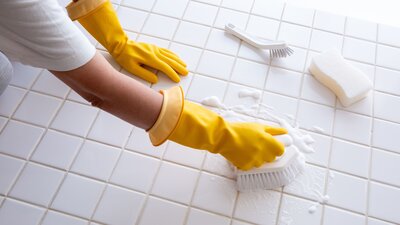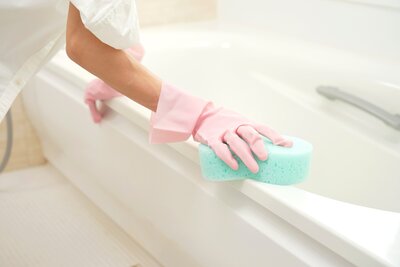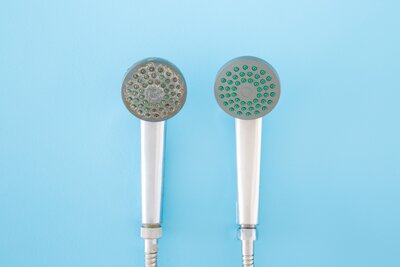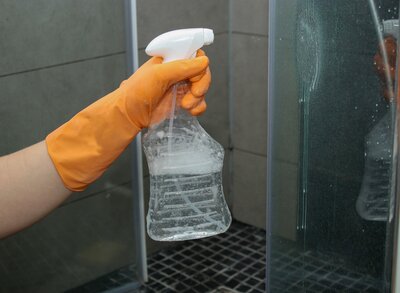Shower Power Tips
Table of Contents
- How Long Does it Take to Clean a Shower?
- Materials & Equipment Needed
- How to Clean a Tile Shower
- How to Clean a Fiberglass Shower/Bathtub
- How to Clean a Stone Shower
- How to Clean a Showerhead
- How to Clean Shower Doors and Hard Water Stains
- Shower Power Tips
- How to Clean & Battle Soap Scum
- Contact Merry Maids
Shower Cleaning Made Easy: Expert Tips for a Spotless Shine
There’s nothing better than stepping into a clean shower after a long day. But if your shower is covered in hard water stains, soap scum, or mildew, it can sap the relaxation right out of the experience.
Keeping your shower clean doesn’t have to be a chore. You can maintain a spotless shower with the right tools, materials, and a simple cleaning routine.
Here’s a complete guide on how to clean your shower, including steps for various shower types, showerhead care, and glass doors, along with tips to make the process easier.
How Long Does It Take to Clean a Shower?
On average, it takes 20-30 minutes to deep clean a shower, depending on the level of grime and type of shower surface.
A quick, regular wipe-down after each use can cut this time down to 5-10 minutes and prevent heavy buildup of stains or soap scum.
Materials & Equipment Needed
- Distilled white vinegar
- Dish soap
- Baking soda
- Scrub brush or sponge
- Microfiber cloths
- Spray bottle
- Squeegee
- Paper towels
- Scrubbing pads
- Old toothbrush (for tight spaces)
- Commercial cleaning products (optional)
How to Clean a Tile Shower

Tile showers are durable but can accumulate grime between grout lines and on tile surfaces.
Here's how to clean a tile shower efficiently:
- Prepare a Cleaning Solution. Mix equal parts of vinegar and water in a spray bottle. For tougher stains, add a teaspoon of dish soap.
- Apply the Solution. Spray the entire shower, paying attention to grout lines. Let the mixture sit for 10-15 minutes to break down dirt and grime.
- Scrub the Grout. Using a scrub brush or an old toothbrush, scrub the grout lines and the tiles. For mold or mildew, sprinkle baking soda on a damp sponge and scrub.
- Rinse. After scrubbing, rinse the tiles thoroughly with warm water.
- Dry. Use a microfiber cloth or a squeegee to wipe down the tiles, preventing future hard water stains.
How to Clean a Fiberglass Shower/Tub

Fiberglass showers are lightweight and affordable but prone to scratches, so be gentle during cleaning.
Here are four fiberglass shower cleaning tips:
- Prepare a Gentle Cleaner. Combine 1 cup of vinegar with 2 tablespoons of dish soap. Avoid abrasive cleaners that can scratch the surface.
- Apply the Solution. Spray the cleaner all over the shower and tub, then let it sit for 10-15 minutes.
- Gently Scrub. Use a non-abrasive sponge or microfiber cloth to scrub the surface. Pay extra attention to any soap scum buildup.
- Rinse and Dry. Rinse thoroughly and dry the surface with a soft towel or microfiber cloth.
How to Clean a Stone Shower
Natural stone showers (such as marble, granite, or travertine) require special care because acidic cleaners like vinegar can damage the stone.
Here are four septs for cleaning your stone shower:
- Use a pH-Neutral Cleaner. Purchase a stone-safe cleaner or mix a mild dish soap with water.
- Apply the Cleaner. Spray the stone with the solution, then let it sit for about 5 minutes.
- Wipe Gently. Using a soft cloth, wipe the stone surfaces carefully, avoiding any abrasive scrubbing tools.
- Rinse. Rinse with clean water to remove any soap residue, then dry with a soft towel.
How to Clean a Shower Head

Mineral buildup can reduce the flow of water from your shower head.
Here's how to clean your shower head:
- Soak the Showerhead in Vinegar. Fill a plastic bag with vinegar and tie it around the shower head, ensuring it is submerged. Let it sit for 30 minutes to an hour.
- Scrub Away Residue. Remove the bag and use a soft brush or old toothbrush to scrub away any remaining residue.
- Rinse. Turn on the shower to flush out any remaining buildup.
How to Clean Shower Doors & Hard Water Stains

Shower doors, especially glass doors, are prone to hard water stains and soap scum.
First things first, here’s how to avoid damage. Do not use brushes, heavy-duty cleaning tools, or scouring powders on shower doors, as they can leave permanent scratches.
Here’s how to clean hard water stains and your shower doors:
- Choose a Cleaner. Purchase a commercial water spot remover or use distilled white vinegar as an inexpensive, natural option. (Note: Do not use vinegar on stone surfaces.)
- Make a Vinegar Solution. Mix ¼ cup of vinegar with ¾ cup of water. Heat the mixture in a microwave-safe bowl for 60 seconds.
- Apply the Cleaner. Pour the solution into a spray bottle. Mist the shower doors and walls thoroughly with the mixture.
- Let It Sit. Allow the solution to sit on the surface for about 3 minutes.
- Wipe Clean. Use a microfiber cloth to wipe away the water spots. For tougher stains, scrub lightly with extra effort.
- Clean Shower Door Tracks. Pour vinegar into the tracks and let it sit for a few minutes. Scrub the tracks with a brush, avoiding contact with the glass. Wipe the tracks clean with paper towels.
- Prevent Future Stains. After each shower, use a microfiber cloth or squeegee to wipe down the doors and walls to prevent hard water stains from forming again.
Shower Power Tips
- Wipe Down Daily. Use a microfiber cloth or squeegee to quickly wipe down the shower after each use. This prevents water spots and soap scum buildup.
- Deep Clean Monthly. Even with regular maintenance, aim to clean your shower deep once a month to tackle any hidden grime.
- Use a Shower Caddy. Keep products organized and off the floor to prevent mildew buildup on bottles and surfaces.
- Keep the Vent On. Good ventilation helps prevent mold and mildew from forming in your shower.
- Prevent Hard Water Stains. Apply a water-repellent spray to your shower doors and walls to minimize mineral deposits.
How to Clean and Battle Soap Scum
Soap keeps your body clean but wreaks havoc on shower walls and floors. In addition to lacking aesthetic appeal, the slimy gunk can be dangerous if enough builds up on the shower floor. A good soap scum remover can spare you the mess, as well as potential slips.
- Create Your Cleaning Solution. You won’t have any problems finding a soap scum remover online or in the grocery store. However, a certain DIY recipe that combines dish soap with vinegar and cornstarch has been growing in popularity due to its effectiveness.
- Apply the Cleaner. After you’ve whipped up your non-toxic soap scum remover, apply it using a spray bottle. Let the solution sit for at least 10 minutes.
- Rinse with Water. Afterward, rinse the soap scum remover from the walls. This make take several tries as the dish soap in the cleaner will bubble as you spray it. And you want to rinse thoroughly so you don’t slip and slide on your concoction. You may need to repeat the process a few times for scummier walls.
If there’s leftover residue, you should be able to wipe it away fairly easily using a sponge or paper towel.
Bonus: This soap scum remover also works wonders on mildew.
Call in Merry Maids - Your Cleaning Calvary
If your shower is in dire need of some attention, and your busy schedule prevents you from doing an initial deep clean, bring in a cleaning service. A professional maid service can provide a thorough scrub—including cleaning hard water stains and getting rid of soap scum—so that afterwards, you only have to maintain the area.Oddly enough, the place where we clean ourselves can become one of the dirtiest areas in the house. But with a little elbow grease and these top-notch cleaning tips, you’ll be able to unwind in a clean shower once more.
Does your spotless shower have you motivated to spruce up the rest of the house? We’ve got the cleaning tips you need to make your home feel homier.














